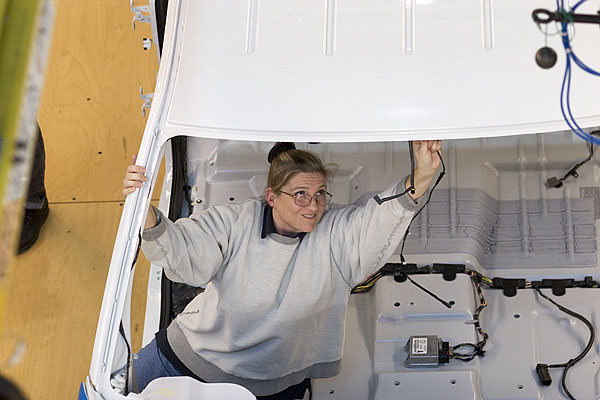Delegates to the United Auto Workers’ national Ford Council opposed reopening their contract in early August to make more concessions. Ford made a $2.3 billion profit in the second quarter of 2009, though the company attributes that to debt swaps and one-off cuts.
In March, Ford workers approved hefty wage, benefit, and work rule concessions by 59 percent, even before GM and Chrysler workers were forced to swallow givebacks in the government bailout. But now, Council delegates—most of them presidents of their local unions—said the rank and file will vote concessions down if more are proposed. Then they, the local officers, will be bounced from office.
“Almost every speaker at the meeting, from several locals, said their plants would vote it down if they come with more concessions,” said Gary Walkowicz, a bargaining committeeperson at Ford’s flagship assembly plant, Dearborn Truck. “I agree with them. People are angry about the last concessions, let alone any more.”
Dearborn Truck’s union president, Nick Kottalis, was quoted by a local newspaper as opposing more concessions.
Since the negotiations began over new concessions, Ford management has held meetings in some plants to make their case that the company is not doing as well as the headlines claim.
A union rep who was in one meeting called by management said the company had seven arguments for more concessions, including its legal costs, weak reputation among consumers, and fragile supply base.
"I agree with saying 'no' next time," said Eric Truss, a worker at Local 600's Dearborn Diversified Manufacturing Plant. At a union meeting, he said if the company and union keep going back for more concessions, holding special votes, "the vote on the last contract would not mean anything—because the contract can just be changed anyway."
PATTERN BARGAINING
UAW Vice President Bob King said Ford wants the same concessions as GM and Chrysler. Top demands include a six-year freeze on new hires’ $14-an-hour pay and elimination and consolidation of skilled trades. Since the meeting, there has been talk of eliminating the right to strike.
Eleven Council members spoke against concessions. A delegate from Ohio said the assembly plants subcouncil had gone on record against givebacks earlier in the day.
Nonetheless, late in the meeting King said he’d come back to delegates if he could negotiate a good trade-off for concessions. He was to officially begin bargaining with Ford on August 25.
If workers say yes, Ford’s gains from its top concession demands will be minimal at present. The company will be hiring few new workers in the next six years, and it hardly needs more concessions by skilled trades because it is already combining jobs ruthlessly.
But management wants to make sure GM and Chrysler gain no labor-cost advantage. “Pattern bargaining,” long a union principle, is now Ford’s to defend—on the way down.





